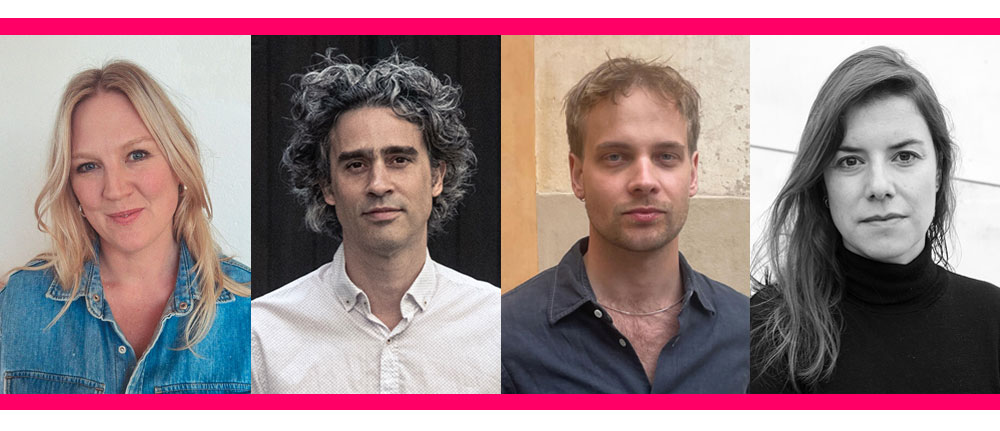Hello and welcome, new doctoral students!
30 October 2025
Hanna Andersson, Runo Lagomarsino, Malte Ottosson, and Bettina Schwalm have now started their PhD projects, which we will all be eagerly following. The projects will deal with visual arts and special needs education, a site's silent archives, contamination as a difficult cultural heritage and, last but not least, weirding.

Visual arts and special needs education teacher Hanna Andersson aims in her PhD project to unite visual arts education practices with special needs education perspectives to examine how aesthetic learning processes can be concretely applied for students in need of additional support in the schools. Aesthetic Learning Processes for a More Inclusive School? An Action Research Study at the Intersection of Art Education and Special Education intends to proceed from a student perspective against two backdrops: first, the goal of the Swedish school system as a school for all, which is currently being challenged by differences in how teaching and support is organised, creating inequalities in students’ opportunities to participate in the teaching and achieve learning goals; and second, the UN Convention on the Rights of the Child, which guarantees children the right to education and to fully develop their abilities. Andersson, Hanna
In the project Nobody Forgets Nothing, artist Runo Lagomarsino examines how sculpture and materials can reveal hidden or repressed narratives in the public space. The project takes its starting point in Lövholmen, one of Stockholm’s last remaining central industrial areas, which has been shaped by pigment production, textile mills, and cement factories. The site bears traces of both local working-class history and global, colonial trade routes. By ‘listening’ to the silent archives of the site – such as pigments, ruins, and material residues – narratives emerge on labour, violence, resistance, and movement. Through sculptural interventions, the project examines how the past lives on in the city’s spaces and buildings, and how art can give shape to that which has been forgotten or suppressed. Can materials carry stories of colonialism, labour, and resistance? And how can art listen to what is no longer said – to the repressed and to the returning? The project is being conducted in collaboration with the Royal Institute of Art. Lagomarsino, Runo
In the project Love Your Monsters: The Toxic Heritage of Contamination, architect Malte Ottosson examines the challenges involved in managing contaminated areas. By understanding contamination as a specific form of difficult cultural heritage, the project draws attention to the fact that long-term sustainable management requires the ability to navigate the complexity of these types of environments from the ground up. How they are experienced as cultural heritage depends less on the nature of the contaminants themselves and more on how they are managed, which highlights the necessity of critically reflective architectural approaches to interventions in these environments. The project is thus an experimental quest for an architectural language capable of managing contamination in – and as an integrated part of – the existing environment. Which aspects, if any, of these sites should be preserved, particularly if the contamination persists? The project is being conducted in collaboration with the Royal Institute of Art. Ottosson, Malte
Global weirding is a term used by researchers to describe how climate change and global crises make the world increasingly unpredictable; weather, politics, technology, behaviours, and social norms are becoming ever ‘weirder’. These experiences of weirdness are a sign that our current mental models are no longer working and Bettina Schwalm sees this as ‘the productive in getting lost’. She uses this as a tool for raising awareness about, and action for, a more sustainable future. By using speculative design (which explores possible futures) and knowledge from psychological research about what is perceived as weird, Schwalm creates in her project The Age of Global Weirding – Experiences for Sustainable Transformation experiences and activities that provoke reflection, with the goal of helping people and organisations develop new ways of thinking and feeling – and thereby consideration for nature, sustainable engagement, and perspectives beyond the human-centric. Schwalm, Bettina
Hanna Andersson, Runo Lagomarsino (photo: Krzysztof Zielinski), Malte Ottosson, and Bettina Schwalm (photo: Christian Crusius)